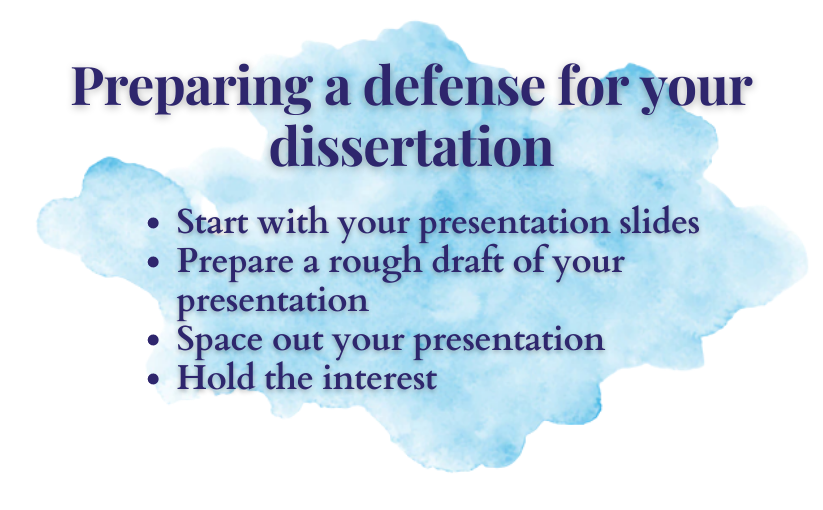Writing a dissertation is definitely a time-consuming and arduous task. After you have completed the written part of your dissertation, you might have to take part in a defense, in which you will present the ideas of your dissertation for approval by the committee members. This blog contains all that you need to know if you are preparing a defense for your dissertation.
This article covers:
- What is a Dissertation Defense?
- How to Organize your Dissertation Defense?
- Preparing a Defense for your Dissertation Defense?
- Tips to Better Prepared for your Dissertation Defense?
- Conclusion
What is a dissertation defense?
Preparing for your dissertation defense is a step you need to consider after you have finished with the writing part of it. A dissertation defense is a presentation you make in front of your committee members to discuss the key ideas and scope of your dissertation. It is an opportunity for you to get valuable feedback from other researchers and professors.
The panel of experts who will assess your presentation will analyze your understanding of your project and raise relevant questions for you. It is important to be prepared for this step if you want the process to go smoothly for you.
How to organize your dissertation defense?
If you have completed writing your Master’s dissertation or thesis, you already have all the material you need for the presentation right in front of you. However, it can be a difficult task to filter down the 70-100 pages of content and bring out the most relevant aspects of your work within a 20-minutes presentation.
As overwhelming as this can be, having your mind on the right things and only focusing on what is the most important from each section of your work will definitely help in preparing a defense. The structure of your presentation can follow the structure of your dissertation. This will help you stay on track and make the process a whole easier for you. This will also help your evaluators to get an idea about the way your dissertation progresses between the sections.
Preparing a defense for your dissertation

1. Start with your presentation slides
Your presentation slides are as important as the ideas you are going to present. It is a visual representation of your key ideas. Decide on a good template and make sure the content in your slide is eye-catching.
- Start with your title slide: Your title slide should include your name, your credentials, as well as the topic for your research.
- Indicate table of contents: This will help you gain an idea about how you could pan out your presentation. If you are going with the structure of your dissertation, you could include the sections on your dissertation in this slide.
- Outline key ideas: Remember your slides, like your dissertation, would go through different drafts. So, take this time to have fun and write the points that come to the top of your head under each section.
2. Prepare a rough draft of your presentation
Now is the time you sit back and go through your dissertation to find the most important points you have raised. Prepare a draft for the verbal part of each section of your slides. Write down the most relevant points after going through your dissertation section by section.
You can update your slides based on the key pointers you will cover in your speech. Your slides and draft for your presentation will change as you plan out your defense but it is important to write or type all that down to not lose track.
3. Space out your presentation
Once you have got all the points you want to cover in your presentation, it is important to make note of how much time you will take to cover those. A good dissertation is always well planned and spaced out.
- Don’t take too much time on abstract and literature review: Your defense for dissertation is ultimately about conveying your original ideas. Your panel might already know everything you want to outline about the literature review. So, keep it short and precise. Take care to bring out the most relevant points and establish the context but don’t go into detail.
- State your interest in your research topic: This is something most evaluators what to know. State the relevance of your work and the reason why you have carried out the research. This will tell them that you have identified the gap in research and your motivation in doing so.
- State the research question: The research question should come up sooner than later. You should be able to state your research question clearly after providing a background of your research. If you have used particular jargon, explicate those as well.
- Explain the research methods: Take time to detail the way you have carried out your research and clearly indicate the research methodologies you have employed during the course of your dissertation.
- Outline your findings: You should take the time you require to outline what your research has added to the literature. Draw from this section of your dissertation and be particularly careful in succinctly bringing out your research’s contribution.
- Touch upon the scope for future research: This tells the panel whether you find any particular relevance to your work. Clearly explain how future research can draw from your work and what are the possible areas of research in your field. If you have any action plan for your research or of any ways your work could impact policy-making in the future, express that.
4. Hold the interest
This is a key element to acing your dissertation defense. Ultimately, if your presentation comes out as boring, the contents of it would not amount to much.
- Practice the verbal part: Ultimately, it is important to voice out your presentation and see if the points you are raising go with your style of speaking.
- Break down sentences that feel too long: Ultimately, you are holding your evaluator’s interest by speech. So, don’t go with everything that reads well on paper. Read out the portions you are going to present and if they are too complicated for the person who is listening to you for the first time, simplify those.
- Practice your body language: Ultimately, like any other presentation, the one way to perfect it would be to practice. Pay attention to your body language as you are practicing. Work on making a good impression.
- Make sure the slides align with your verbal presentation: Once you have perfected the verbal part for your defense, make sure that the slides reflect well the highlights of what you are conveying verbally.
Tips to be Better Prepared for your Dissertation Defense
a). Attend a defense:
This is the best way you could know understand the process. Not all University allows their students to attend the defenses but you should try out your luck. Go, take down notes, notice the kind of questions raised by the committee and evaluate the way the researcher is answering them.
b). Know the drill:
Find out everything you can about the defense expected of you. Make note of the dates, talk to your course instructor or supervisor, and check out the university guidelines about what is expected from your defense.
c). Stay organized:
Do not wait until the last few days. Organize your time well. Make sure your slides are on point and present in front of your friends or an empty audience to make sure you are spacing out your sections well and can finish your presentation within the time limit given to you.
d). Be a step ahead:
You might be facing a committee of experts, but ultimately your topic of research is your expertise. So, anticipate the questions, write them down and prepare answers in advance.
e). Take this as a learning opportunity:
It is important not to forget that ultimately you are presenting your dissertation to get valuable feedback and to see what others think of it. Make a learning opportunity out of it and understand where the evaluator’s questions come from. It is important to remember they are only analyzing your understanding of your work and are not there to dispute it.
Let’s Conclude
We hope this article has put your mind a little at ease about preparing for your dissertation defense. You have already done the ginormous work by completing your dissertation and the defense is only a test to see how you can convince others about the relevance of your work. For more content about dissertation writing and other tips, follow our blog!
-Lily Brooke


